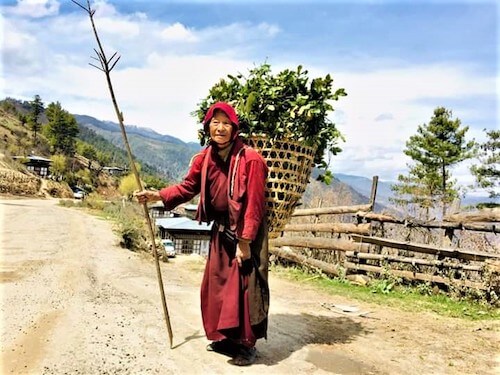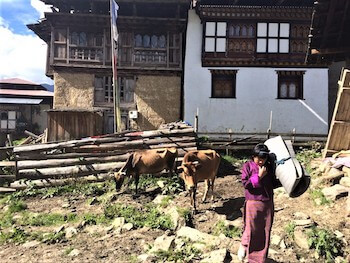 Since earliest times, visitors to Bhutan have been struck by the strongly egalitarian nature of the society. Unlike its neighbouring countries, Bhutan has never had a rigid class system and social and educational opportunities are not affected by rank or birth. Bhutanese women enjoy equal rights with men, taking an active part in the affairs of the country. While the family system is basically patriarchal and family estates are divided equally between sons and daughters. Both men and women are free to choose whom to marry and both can initiate the divorce. Divorce is common and can be settled either in a civil court or by mutual consent in the presence of elders and honoured persons.
Since earliest times, visitors to Bhutan have been struck by the strongly egalitarian nature of the society. Unlike its neighbouring countries, Bhutan has never had a rigid class system and social and educational opportunities are not affected by rank or birth. Bhutanese women enjoy equal rights with men, taking an active part in the affairs of the country. While the family system is basically patriarchal and family estates are divided equally between sons and daughters. Both men and women are free to choose whom to marry and both can initiate the divorce. Divorce is common and can be settled either in a civil court or by mutual consent in the presence of elders and honoured persons.
While the urban settlements have sprung up but still a majority of the population continue to live in small villages on riverbanks or gently sloping hills, overlooking a patchwork of fields and pasture lands. Largely self-sufficient in food, they grow crops and graze animals for meat, butter, cheese, and milk.
Traditional houses, which may rise as high as three stories, are built of stone, wood and clay. Reminiscent of Swiss chalets, they are often adorned with lively motifs. Traditionally these houses are constructed entirely without nails – an architectural feat which has also been followed in the building of large Dzongs which are the centre of the community’s temporal and spiritual life. The shingled roofs are held in place by heavy stones to prevent their being carried off by the strong winds which sweep through the valleys. Windows have sliding panels, and narrow treaded stairs connect one floor to the next. Domestic animals are quartered on the ground floor, the first floor is the family’s living and storage area, while those above are used for sleeping.
 The Bhutanese diet is rich in meat, cereals particularly rice – vegetables and herbs. Meat dishes mainly pork and beef, are lavishly spiced with chillies, and it is common to see these bright red peppers drying on roofs in sun. Salted butter tea is served on all social occasions. 'Chang', a local beer, and 'Ara', a spirit distilled from rice, maize, wheat of barley, are also favourite beverages. 'Doma', or betal nut, is offered as a customary greeting.
The Bhutanese diet is rich in meat, cereals particularly rice – vegetables and herbs. Meat dishes mainly pork and beef, are lavishly spiced with chillies, and it is common to see these bright red peppers drying on roofs in sun. Salted butter tea is served on all social occasions. 'Chang', a local beer, and 'Ara', a spirit distilled from rice, maize, wheat of barley, are also favourite beverages. 'Doma', or betal nut, is offered as a customary greeting.
Rugged mountainous terrain and extremes of climate have made the Bhutanese a hardy, well-built people, accustomed to working hard. Despite the strong martial spirit which has enabled them to retain their national independence and sovereignty over the centuries, they are peaceful and fun-loving.